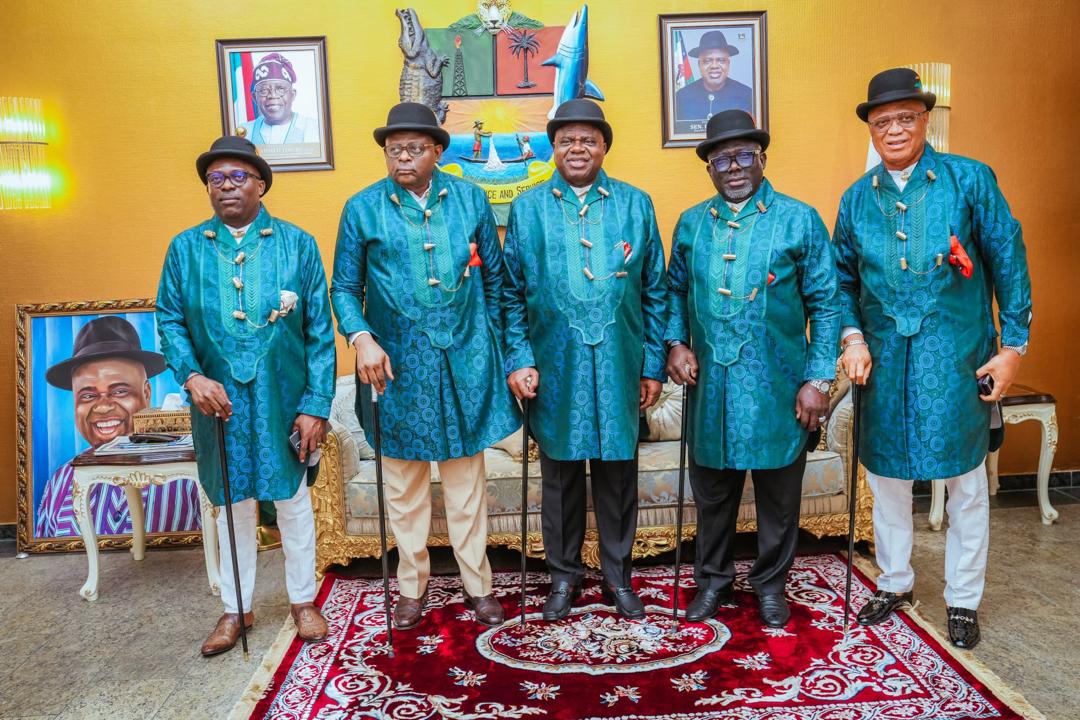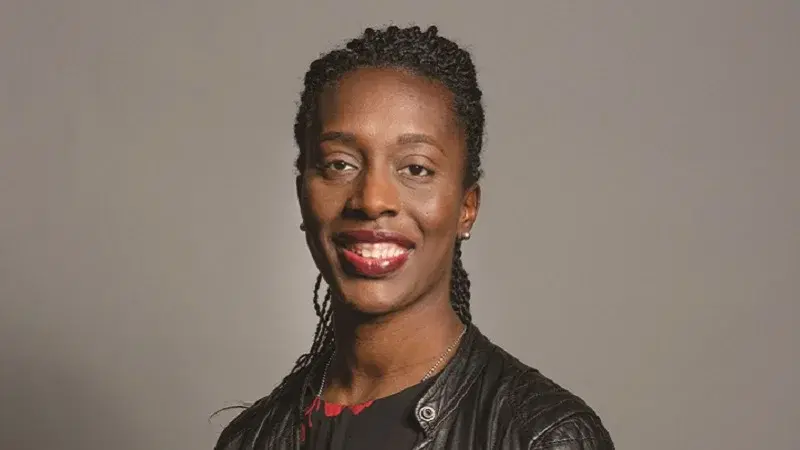News
PDP Govs Sent 10 Ministerial Nominees To Tinubu, Says Wike
Newly sworn-in Minister of the Federal Capital Territory (FCT), Nyesom Wike, has disclosed how governors of the Peoples Democratic Party (PDP) sent 10 ministerial nominees to President Bola Tinubu for consideration.
Wike, who assumed office on Monday shortly after he was sworn in by the President, said he would not be biased in sanctioning anyone who violates extant municipal planning laws.
He said even if it was discovered that the PDP national secretariat was without a Certificate of Occupancy, he would not hesitate to pull it down.
“I don’t care how you feel and where you come from, my task is to ensure Abuja comes to where it should be. I am here to turn Abuja around. That is the work I have been sent here to do and I am going to do just that.
“They said PDP will sanction me for taking appointments, did PDP governors not write to beg Mr. President for appointment some people? The president asked the 36 state governors to recommend people for appointment. The PDP governors wrote and nominated 10 persons,” he stated.
Wike also declared that he had not come to Abuja to fly any party’s flag.
At his maiden news conference, the minister who is a member of the main opposition party, PDP, was reacting to questions about whether he would fly the national flag and that of his party or that of the ruling All Progressives Congress (APC).
“Why should anyone be bothered about what party flag I will be flying? Okay, bring PDP flag, I will fly it, bring Labour Party flag, I will fly it. The FCT is in this state and you think the people are bothered about the party flag I fly? I will fly the Nigerian flag and ensure the FCT returns to the dreams of the founding fathers.
“We will bring FCT back to where it ought to be. So many people have complained that this is not the FCT of the founding fathers. We must tackle issue of insecurity. FCT should be where people come for holidays”, he said.
Wike, who spoke at length on his mandate, also pledged to restore the city’s master plan, adding that land allottees who had been given Certificates of Occupancy but failed to develop would also lose their lands to give way to those ready to build.
“If you know you have built where you are not supposed to build, it will go down”, he said.
He also reeled out a 10-point agenda with emphasis on security, city sanitation, preservation of Abuja Master Plan, infrastructure development, restoration of green areas, removal of shanties, plugging revenue leakages, ground rents payment, among others.
He warned that the administration under his leadership, would not take excuses from security agencies as they would be provided with the required tools to work.
On the landscape of the city, Wike said: “Abuja has turned into a slum city. Sanitation is bad with refuse everywhere. We cannot allow that, we will look at issues of waste disposals.
“If you build on a green area, sorry, it will go down. Those who were allocated land and refused to develop them, we will revoke such lands and re-allocate them to those who are ready to develop them. Those who don’t pay ground rent, we will not notify them to do so, but I will not be tired of signing revocation notices.
“Uncompleted buildings that have become a safe haven for criminals will be reclaimed by the government and put them to good use. Land racketeering days are over. Those who refuse to develop, turning to land speculators will lose their lands.”
“Time is up. The goal is to sanitize Abuja and make it safe for everyone.
“We will consult with stakeholders, the natives, and herdsmen to address some of these problems, including open grazing.
“We will provide alternatives to reduce the suffering of the people, particularly those without private vehicles.
“We will bring back mass transit to improve access to public transportation, and therefore, the person in charge of transportation must keep his records clean.
“We will provide security agencies with necessary tools and logistics and after that, we will not want to hear any excuses. What we want to see is results.”
News
Let’s Approach Regional Development Issues Differently – Fubara …As S’South Govs Host Fubara To 50th Birthday Celebration

Rivers State Governor, Sir Siminalayi Fubara, has sued for a change in the current approach adopted by South South Governors in their pursuit to achieve holistic regional development and economic prosperity.
The governor insisted on de-emphasis in vested individuals’ political interests while looking at the bigger picture of achieving enduring regional integration that will strengthen unity of purpose to change the trajectory of development in the region.
Fubara made the appeal during the meeting of Governors of South-South States, under the auspices of BRACED Commission, at the Bayelsa State Government House in Yanagoa on Tuesday.
This was contained in a statement by the Chief Press Secretary to the Governor, Nelson Chukwudi.
BRACED is an acronym for Bayelsa, Rivers, Akwa Ibom, Cross River, Edo and Delta.
He said: “I want to appeal that if we have to succeed in this drive, we need to keep our political differences aside and understand that the struggle, as at today, is for posterity, for the development of our region.
“It is really sad that in Niger Delta that is the economic base of this country, the construction of a road that you tagged ‘East-West Road’ could be an issue, that we need to beg, protest, and complain to get it fixed. I don’t think it is proper.”
Governor Fubara stated that it is not that the federal authorities do not understand that Niger Delta needs the road but quickly added that they have seen that even the people of the region do not take themselves seriously.
The governor said the moment Niger Delta people stopped playing to the gallery, and place value on themselves, outsiders will have no option than to accord the region and its people due regard.
Fubara said: “On my part, I want to say this: This is not the first time we are meeting. For me, I followed the course of the region meeting in a forum that we tagged “BRACED Commission.”
“BRACED Commission is also one of the bodies that was constituted at that time to support and work out development strategies for this region. But what I am seeing today is just limiting this meeting to only BRACED COMMISSION.
“We need to widen the scope where other leaders of the region should be part of the discussion of the development of the region, and I think this is the direction that will help the region.”
Reading the Communique of the meeting, the new Chairman of the Forum of Governors of South-South States, and Governor of Bayelsa State, Senator Douye Diri, said they support the Federal Government Tax Reform Bills, and urged President Bola Tinubu to extend the Value Added Tax (VAT) sharing percentages to oil and gas derivation.
He stated the Forum’s request to the Federal Government to urge relevant stakeholders and agencies to extend remediation of polluted environment ongoing in Ogoni land to other impacted communities and States in the region.
Governor Diri also said that the Forum resolved to establish a structural regional security network to enhance safety and security, foster stable Niger Delta region conducive for economic growth and prosperity.
Highlight of the event was the hosting of Governor Fubara to a surprise 50th Birthday celebration by the Governors of South-South States at the Government House in Yenagoa.
News
Fubara Lauds Tinubu For Setting Up Education Load Fund … Vows To Ensure Rivers Benefit Maximally From Scheme

The Rivers State Government has applauded President Ahmed Bola Tinubu for conceiving the idea of setting up the Nigeria Education Loan Fund (NELFUND) which has opened up opportunities for youths to acquire tertiary education irrespective of their financial status.
Rivers State Governor, Sir Siminalayi Fubara, gave the commendation while playing host to a delegation from NELFUND who came on an advocacy visit to the Government House in Port Harcourt on Tuesday.
Represented by his deputy, Prof. Ngozi Nma Odu, Governor Fubara said in developed countries it is common for people to go through school with loans which they sometimes pay all throughout their lives, noting that “for us, it is more accessible and more friendly because you would be required to pay back the loan two years after your National Youth Service.
“It is a win-win situation; it is a situation where the youths in Nigeria should not say because my parents are poor or passed away I cannot improve on my educational growth. This offers them a golden opportunity and I am glad you came for this advocacy.”
The governor urged NELFUND to intensify its advocacy to let the people know how they can benefit from it, adding that it is more important when talking about vocational institutions.
“If you look at the developed countries it is people that went to the vocational schools that make so much money, because it is pricey to get somebody to do anything, we need to instil this into our people, our youths, because people sometimes tend to look down on people that went to vocational schools, it should not be,” he said.
Fubara expressed delight with the NELFUND programme and assured that the State Government would do whatever it can to ensure Rivers State benefits maximally from the scheme.
In his remarks, the Managing Director and Chief Executive of NELFUND, Dr. Akintunde Sawyer, informed the governor that they were in Rivers State to seek the support of the State Government towards the loan, stressing that President Tinubu has directed them to ensure no Nigerian student who has the ability and desire to get educated at tertiary level is denied the opportunity due to lack of funding.
He explained that the scheme provides interest-free loans to students who apply, adding that these loans are not repayable until two years after their Youth Service when they must have gotten a job.
News
UK Appoints British-Nigerian As Trade Envoy To Nigeria

A British-Nigerian politician, Florence Eshalomi, has been appointed as the United Kingdom’s trade envoy to Nigeria.
Her appointment makes Eshalomi the second Nigerian to hold the position.
Confirming her appointment on X on Tuesday, she wrote: “It is an honour to have been appointed as the United Kingdom’s Trade Envoy to Nigeria.
“I’m looking forward to building on my close ties with Nigeria to promote a strong and flourishing economic relationship between our two great nations.
“I am looking forward to strengthening the UK’s relationship with Nigeria to explore shared growth and opportunities for both countries.”
Announcing the appointment in a statement on Tuesday, Jonathan Reynolds, the UK’s Business and Trade Secretary, said the decision was aimed at attracting investment into the UK and boosting economic growth.
“I’ve launched a new team of trade envoys who will use their experience, expertise, and knowledge to unlock new markets around the world for British businesses, attract investment into the UK, and ultimately drive economic growth,” Reynolds said.
Eshalomi, 44, is an MP representing the Vauxhall and Camberwell Green constituency.
She holds a Bachelor of Arts (Hons) in Political and International Studies with Law from Middlesex University.
-
Politics4 days ago
Presidency, APC React As El-Rufai Criticises Party, Urges United Opposition
-

 Niger Delta4 days ago
Niger Delta4 days agoNDDC’s Performance, Boost To Tinubu’s Government – Coalition
-
Politics4 days ago
Same Faith Ticket, CAN Yet To Decide For 2027
-

 Business4 days ago
Business4 days agoUBA To Educate SMEs, Business Owners On Withholding Tax
-
Business4 days ago
Data Privacy Ecosystem Can Drive Trillion Dollar Economy – NDPC
-
Rivers4 days ago
PHCCIMA Breaks Down Rivers 2025 Budget
-
Politics4 days ago
Diri Emerges South-South Governors Forum Chairman As Forum Gives Nod To FG’s Tax Reform Initiative
-
Business4 days ago
NUPRC Targets N15tn Revenue In 2025

